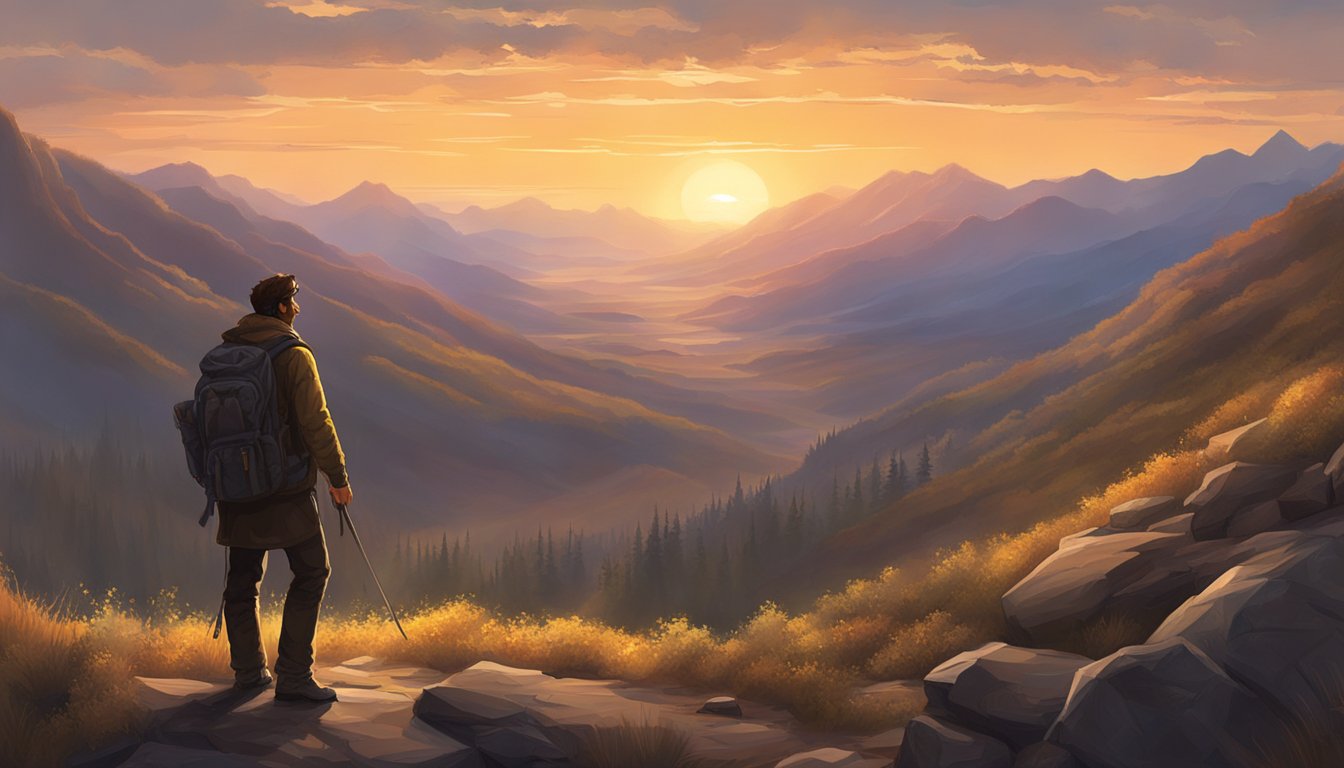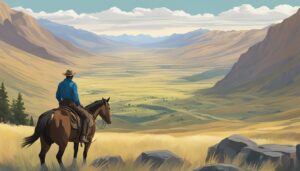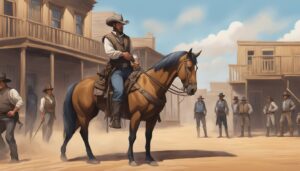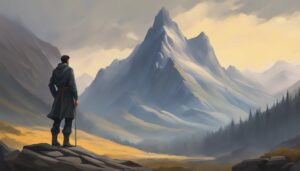Western heroes have captivated audiences for generations, embodying rugged individualism and frontier justice. Two iconic figures stand out in this genre: Josey Wales from “The Outlaw Josey Wales” and John Dutton from the TV series “Yellowstone.” Both characters showcase the enduring appeal of the Western archetype while adapting to different eras.
Josey Wales, portrayed by Clint Eastwood, is a Civil War-era outlaw seeking vengeance for his murdered family. His journey takes him through the untamed West, where he confronts enemies and forges unlikely alliances. John Dutton, played by Kevin Costner, is a modern-day rancher fighting to protect his family’s legacy in Montana. While both characters display remarkable strength and determination, John Dutton’s complex navigation of contemporary challenges arguably makes him a more nuanced and relatable Western hero for today’s audiences.
These characters represent different facets of the Western genre. Josey Wales embodies the classic lone gunslinger archetype, while John Dutton grapples with preserving traditional values in a changing world. Their stories, set nearly 150 years apart, demonstrate the evolution of the Western hero and the enduring appeal of tales set in the American frontier.
The Legends of Western Cinema
Western cinema has produced iconic heroes and influential filmmakers who shaped the genre. Clint Eastwood and Kevin Costner stand out as actors who embodied legendary cowboy characters, while also making significant contributions behind the camera.
Iconic Portrayals by Eastwood and Costner
Clint Eastwood’s portrayal of Josey Wales in “The Outlaw Josey Wales” became a defining role in Western cinema. His stoic demeanor and gritty performance set a new standard for cowboy anti-heroes.
Kevin Costner’s John Dutton in “Yellowstone” represents a modern take on the classic Western patriarch. Dutton’s complex moral stance and struggle to preserve his family’s legacy resonate with contemporary audiences.
Both actors brought depth and nuance to their roles, creating memorable characters that transcend typical Western archetypes.
Directorial Impact of Clint Eastwood and Taylor Sheridan
Clint Eastwood transitioned from actor to acclaimed director, helming several influential Westerns. His directorial style often explores themes of justice and redemption within the genre.
Taylor Sheridan, creator of “Yellowstone,” has revitalized the Western for television audiences. His writing and direction blend traditional Western elements with modern storytelling techniques.
These filmmakers have pushed the boundaries of the genre, creating works that both honor and reinvent Western traditions.
Westerns in the World of Cinema
Western films have long held a special place in cinematic history. The genre has evolved from straightforward good-vs-evil tales to more complex narratives.
Revisionist Westerns, popularized in the 1960s and 70s, challenged traditional Western tropes. They introduced morally ambiguous characters and explored darker themes.
Today, Westerns continue to adapt, incorporating contemporary issues while maintaining core elements of the genre. This evolution ensures that Western stories remain relevant and captivating for modern viewers.
Character Analysis
John Dutton and Josey Wales represent contrasting yet equally compelling Western hero archetypes. Their complex personalities and motivations shape their actions and moral codes in distinct ways.
John Dutton’s Leadership of Yellowstone Ranch
John Dutton embodies the modern ranching patriarch, fiercely committed to preserving his family’s legacy and vast Montana estate. His leadership style blends rugged determination with strategic cunning. Dutton’s moral ambiguity adds depth to his character, as he often resorts to ethically questionable methods to protect his interests.
His unwavering loyalty to family and tradition serves as a driving force behind his actions. Dutton’s complex psychology reveals inner turmoil as he navigates the challenges of maintaining power and influence in a changing world.
Josey Wales: The Quintessential Outlaw Hero
Josey Wales epitomizes the classic outlaw hero archetype. Driven by a thirst for vengeance, Wales transforms from a peaceful farmer into a skilled gunslinger. His journey is marked by a reluctant embrace of violence as a means of survival and justice.
Wales’ character is defined by his fierce independence and distrust of authority. Despite his outlaw status, he displays a strong moral code and a capacity for compassion. His ability to form unlikely alliances and protect the vulnerable adds layers to his persona.
Evolution of Morality and Justice in Western Heroes
John Dutton and Josey Wales represent different stages in the evolution of Western hero archetypes. Dutton’s morality is shaped by the complexities of modern land ownership and power dynamics. He often operates in gray areas, justifying his actions as necessary for the greater good of his family and legacy.
Wales, set in a post-Civil War era, adheres to a more straightforward code of frontier justice. His moral compass is guided by personal loyalty and a desire to right perceived wrongs.
Both characters challenge traditional notions of heroism. They blur the lines between right and wrong, forcing audiences to question the nature of justice in their respective contexts.
Historical and Cultural Context
The characters of John Dutton and Josey Wales emerge from distinct periods in American history, shaping their motivations and worldviews. Their stories reflect complex social and political dynamics that continue to resonate with modern audiences.
The Representation of the Civil War Era
Josey Wales is deeply rooted in the aftermath of the Civil War. The film portrays the brutal conflict between Union and Confederate forces, with Wales starting as a Missouri farmer who joins Confederate guerrillas after Union soldiers murder his family. This backdrop of violence and vengeance reflects the bitter divisions of the era.
The Civil War’s impact on ordinary citizens is a central theme, showcasing the personal cost of the conflict. Wales’ journey from farmer to outlaw highlights the war’s transformative effect on individuals and communities.
Influence of Real Historical Figures
John Dutton’s character draws inspiration from 19th-century cattle barons who shaped the American West. These influential ranchers wielded significant economic and political power, often clashing with homesteaders, Native Americans, and government officials.
Josey Wales’ story parallels real Confederate guerrillas like William Quantrill and “Bloody Bill” Anderson. These historical figures engaged in brutal tactics during the war, blurring the lines between soldier and outlaw.
Both characters’ narratives incorporate elements of Native American representation, reflecting the complex relationships between settlers and indigenous peoples during westward expansion. This aspect adds depth to their stories and connects them to broader historical themes.
Storytelling Elements

John Dutton and Josey Wales embody complex characters shaped by their environments and experiences. Their stories explore themes of justice, family, and the struggle to maintain a way of life in changing times.
Themes of Vengeance and Redemption
Josey Wales seeks vengeance against Union soldiers who murdered his family during the Civil War. His journey transforms from revenge to redemption as he finds a new family and purpose. John Dutton’s motivations stem from protecting his land and legacy, often leading to morally ambiguous choices. Both characters grapple with the consequences of their actions and the toll of violence on their souls.
Josey’s path intersects with Confederate bushwhackers, adding layers to his quest for justice. John’s conflicts arise from modern threats to his ranch, forcing him to confront ethical dilemmas in defense of his heritage.
Conflict and Resolution in Western Narratives
The Outlaw Josey Wales portrays a post-Civil War landscape where lawlessness and frontier justice prevail. Josey navigates this world as an outlaw, facing challenges from both authorities and rival factions.
Yellowstone sets its conflicts in a contemporary West, where legal battles and corporate interests threaten the Dutton ranch. John employs a mix of traditional cowboy tactics and modern strategies to outmaneuver his opponents.
Both narratives showcase the protagonists’ resourcefulness and determination in overcoming obstacles, a hallmark of Western storytelling.
The Role of Family and Legacy
Family plays a central role in both stories. Josey Wales loses his original family but forms a new one with diverse characters he meets on his journey. This chosen family becomes his redemption and reason to live.
The Dutton family dynamic drives Yellowstone’s plot. John’s relationships with his children, including the strong-willed Beth and conflicted Jamie, create complex storylines. Grandma Sarah represents the family’s deep roots and connection to the land.
John’s efforts to preserve his family’s legacy often clash with his children’s personal ambitions, creating internal conflicts that mirror external threats to the ranch.
Supporting Characters and Performances

Both Yellowstone and The Outlaw Josey Wales feature compelling supporting casts that enrich their stories. Key allies and antagonists add depth to the narratives, while standout performances elevate the overall quality of each production.
Memorable Allies and Antagonists
In Yellowstone, Beth Dutton (Kelly Reilly) stands out as John’s fiercely loyal daughter and strategist. Her ruthless tactics and complex relationship with ranch hand Rip Wheeler create compelling storylines. Jamie Dutton, John’s adopted son, adds tension as a conflicted character torn between family loyalty and personal ambition.
The Outlaw Josey Wales introduces Lone Watie, portrayed by Chief Dan George. This elderly Cherokee man becomes an unlikely companion to Josey, providing both comic relief and cultural perspective. Their partnership highlights themes of survival and friendship in a harsh frontier landscape.
Impactful Performances by Supporting Cast
Kelly Reilly’s portrayal of Beth Dutton in Yellowstone is particularly noteworthy. Her intense, nuanced performance brings depth to Beth’s damaged psyche and razor-sharp wit. Reilly’s chemistry with co-stars, especially in scenes with Rip Wheeler, adds emotional weight to the series.
In The Outlaw Josey Wales, Chief Dan George delivers a standout performance as Lone Watie. His deadpan humor and quiet dignity provide a perfect foil to Clint Eastwood’s stoic protagonist. George’s portrayal earned him an Oscar nomination, highlighting the impact of his supporting role.
Both productions benefit from strong ensemble casts that bring richness and authenticity to their respective Western settings.
Cinematography and Score

Western films captivate audiences through their visual and auditory artistry. The sweeping landscapes and emotive musical compositions create an immersive experience that transports viewers to the rugged frontier.
Visual Storytelling in the Western Landscape
“Yellowstone” and “The Outlaw Josey Wales” showcase stunning cinematography that brings the American West to life. “Yellowstone” utilizes modern techniques to capture Montana’s vast expanses, employing drone shots and high-definition cameras. The series highlights the Dutton ranch’s natural beauty, contrasting it with encroaching development.
“The Outlaw Josey Wales” relies on traditional cinematography to depict post-Civil War Missouri and the Texas frontier. Director Clint Eastwood and cinematographer Bruce Surtees create a gritty, realistic atmosphere. They use natural lighting and wide-angle shots to emphasize the harsh environment Josey Wales navigates.
Musical Scores That Define a Genre
Jerry Fielding’s score for “The Outlaw Josey Wales” blends folk melodies with orchestral elements. His compositions enhance the film’s emotional resonance, particularly during scenes with Grandma Sarah Turner. Fielding’s work earned an Academy Award nomination, solidifying its place in Western film history.
“Yellowstone” features a contemporary score by Brian Tyler. His music combines traditional Western themes with modern orchestral arrangements. The score utilizes strings and percussion to evoke Montana’s landscapes and the show’s dramatic storylines. Tyler’s work updates the Western sound for a new generation of viewers.
Cultural Impact and Legacy
John Dutton and Josey Wales have left indelible marks on the Western genre, reshaping audience perceptions and earning critical acclaim. Their stories continue to resonate with viewers, influencing popular culture and cinema history.
Revising the Western Genre Through Contemporary Lenses
“Yellowstone” refreshed the Western for modern audiences. John Dutton’s character explores themes of land ownership, family legacy, and political power in the 21st century American West. The show’s popularity sparked renewed interest in ranch life and cowboy culture.
The 6666 Ranch featured in “Yellowstone” became a real-world tourist attraction. Fans seek authentic Western experiences, boosting local economies in filming locations.
“The Outlaw Josey Wales” presented a nuanced view of post-Civil War America. Josey Wales, a Confederate soldier, challenged simplistic notions of good and evil in Westerns. The film explored themes of reconciliation and the human cost of conflict.
Legacy and Recognition in Film History
“The Outlaw Josey Wales” earned critical acclaim for its revisionist take on the Western genre. The film’s cultural significance led to its preservation in the National Film Registry in 1996.
Clint Eastwood’s portrayal of Josey Wales influenced subsequent Western anti-heroes. The character’s complexity paved the way for morally ambiguous protagonists in films like “Unforgiven.”
Kevin Costner’s John Dutton became a cultural icon, epitomizing the modern rancher fighting to preserve a way of life. The Dutton family’s saga sparked discussions about land use, Native American rights, and the changing face of the American West.
Both characters continue to inspire filmmakers and storytellers, ensuring their legacies endure in popular culture.
Comparative Analysis
John Dutton and Josey Wales embody the archetypal Western hero, yet their approaches to justice and leadership diverge significantly. Their unique traits and motivations shape their responses to challenges in their respective worlds.
Unique Traits of the American Western Hero
The American Western hero typically embodies rugged individualism and a strong moral code. John Dutton from Yellowstone represents a modern take on this archetype. He’s a powerful rancher fighting to preserve his family legacy and land. Dutton’s complex personality blends traditional values with ruthless business acumen.
Josey Wales, the protagonist of The Outlaw Josey Wales, fits the classic loner mold. He’s a skilled gunfighter seeking vengeance for his murdered family. Wales’ journey transforms him from a revenge-driven outlaw to a reluctant leader and protector.
Both characters showcase the Western hero’s trademark resilience and skill with firearms. They navigate harsh landscapes and face formidable adversaries with unwavering determination.
Dutton Versus Wales: Who Stands Taller?
John Dutton’s strength lies in his role as a family patriarch and influential landowner. He wields political and economic power to protect his interests. Dutton’s modern setting allows for more nuanced conflicts involving corporate interests and governmental pressures.
Josey Wales, operating in the post-Civil War era, relies more on his individual abilities and cunning. His journey from lone wolf to community leader showcases personal growth and adaptation.
Dutton’s actions often blur ethical lines, while Wales adheres to a simpler code of honor. Both men inspire loyalty, but Dutton’s methods can be more questionable. Wales gains followers through his actions and reluctant heroism.
In terms of leadership, Dutton actively seeks to maintain his position. Wales’ leadership evolves organically as others are drawn to his strength and protective nature.
Conclusion
John Dutton and Josey Wales stand as iconic figures in the Western genre. Both characters embody the rugged individualism and complex morality typical of revisionist Westerns. Dutton’s modern-day rancher grapples with changing times, while Wales represents a post-Civil War outlaw seeking justice.
“Yellowstone” catapulted John Dutton into pop culture prominence. The show’s massive popularity brought renewed interest to the Western genre. Dutton’s character resonates with viewers through his fierce protection of family and land.
“The Outlaw Josey Wales” remains a classic of 1970s cinema. Josey Wales left an indelible mark on the revisionist Western movement. His journey from peaceful farmer to reluctant gunslinger showcased the moral ambiguity of the Old West.
Both characters have shaped perceptions of the American frontier. They reflect different eras and challenges, yet share a common thread of resilience. Dutton and Wales continue to captivate audiences, ensuring the Western’s enduring legacy in film and television.



